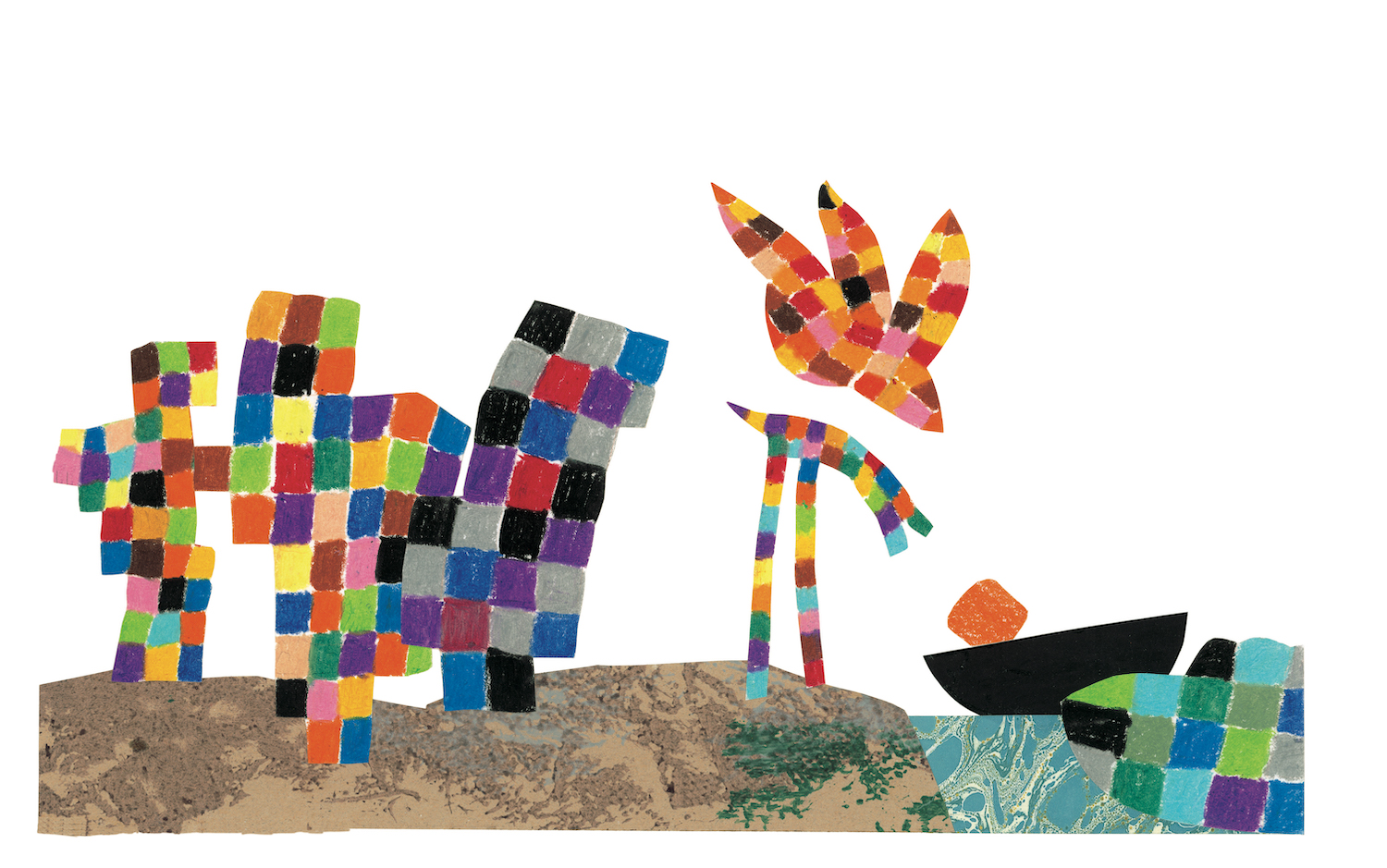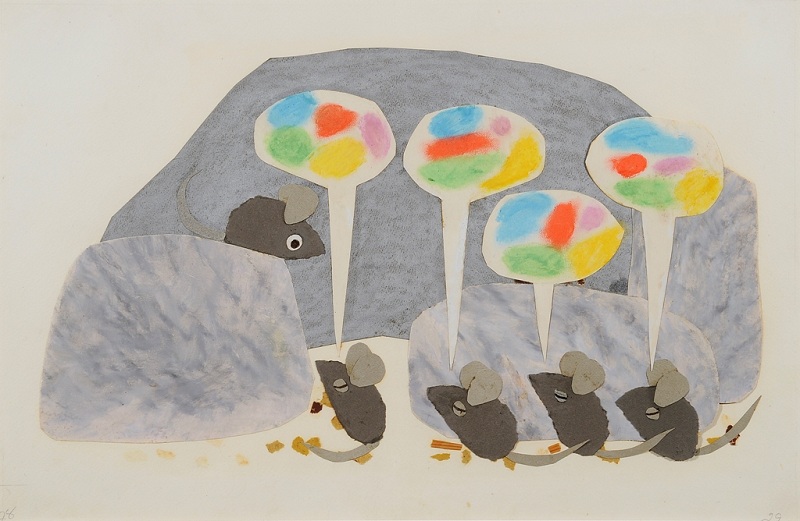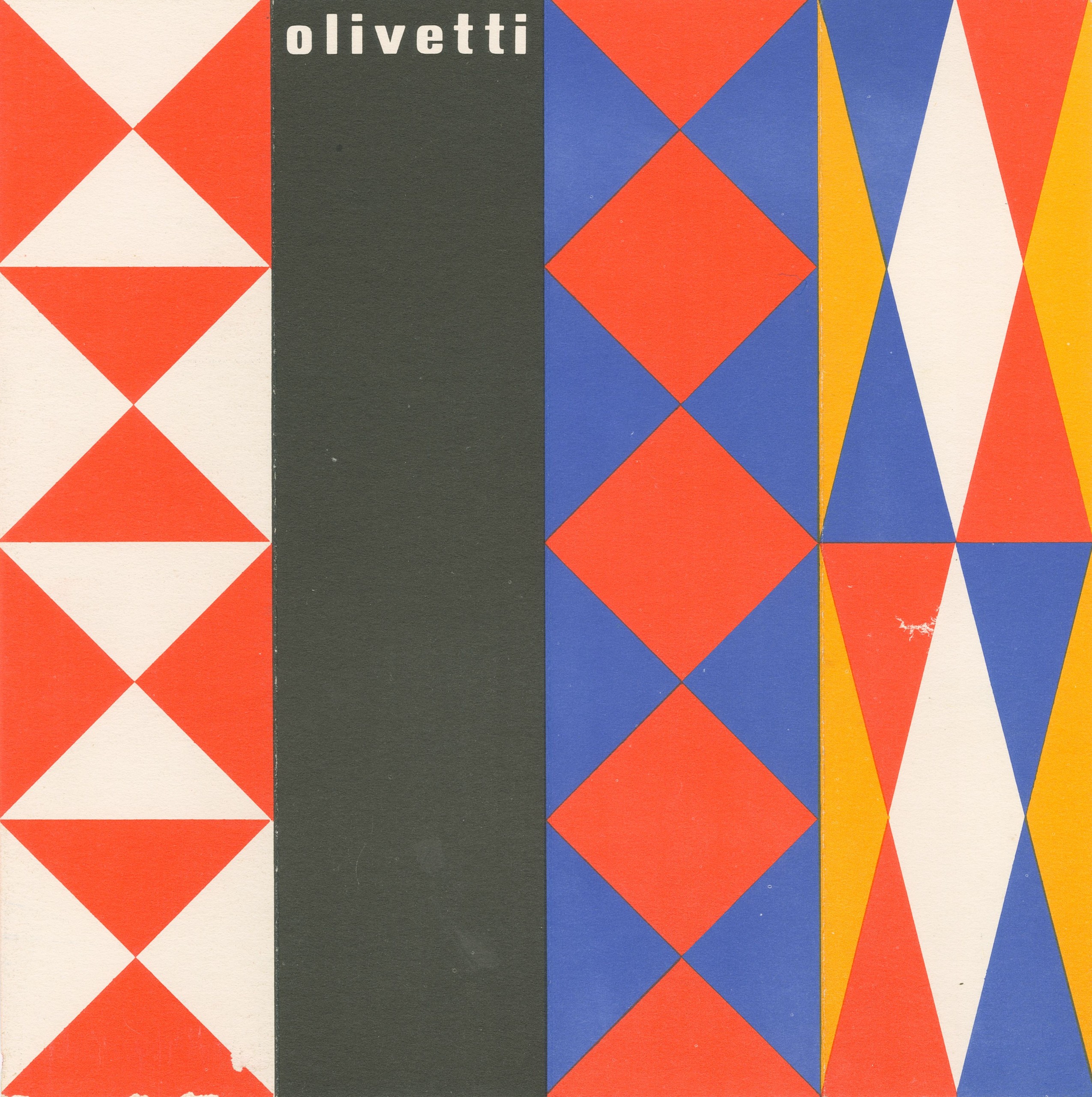FOR IMMEDIATE RELEASE
September 7, 2023
Norman Rockwell Museum Mounts First Major American Retrospective of Leo Lionni
New exhibition explores art and life of visionary modernist graphic designer, children’s book creator, and fine artist
November 18, 2023, through May 27, 2024

Leo Lionni (1910-1999)
All his friends were waiting for him
Illustration for Pezzettino, 1975 (Knopf)
Mixed media collage
© Leo Lionni. All rights reserved.
Courtesy of the Lionni Family

Leo Lionni (1910-1999)
“And how about the colors, Frederick?” they asked anxiously
Illustration for Frederick, 1967 (Knopf)
Collage on paper
© Leo Lionni. All rights reserved.
Courtesy of the Lionni Family
STOCKBRIDGE, MA, September 7, 2023—Norman Rockwell Museum presents the first major American retrospective of artist Leo Lionni, a groundbreaking modernist graphic designer and magazine art director who gained worldwide popularity as the writer and illustrator of nearly 40 children’s books in as many years. Opening November 18 and running through May 27, 2024, Between Worlds: The Art and Design of Leo Lionni explores the artist’s vision and legacy across three distinct yet interrelated domains: graphic art and design; children’s books; and personal works in various media.
“The diversity of his legacy, and the relative separation of these fields during his lifetime, has resulted in a less than complete view of Lionni’s work and influence. This exhibition brings together Lionni’s achievements within the frame of a single, if expansive, artistic life,” observed Norman Rockwell Museum Deputy Director and Chief Curator Stephanie Haboush Plunkett.
Previous museum shows of Lionni’s work were organized in Italy (Bologna, 1990) and Japan (1996, 2012, 2018), two deeply design-conscious countries in which the artist has been popular for decades. The present exhibition is the first time a major retrospective has been mounted in the United States.
Together with Stephanie Haboush Plunkett, Between Worlds: The Art and Design of Leo Lionni is co-curated by author and children’s book historian Leonard S. Marcus, one of the world’s foremost authorities on children’s books, and illustration and design historian Steven Heller, who has written widely on graphic design, illustration, and political art. The Museum is also working closely with Annie Lionni, the artist’s granddaughter, who had a close relationship with her renowned grandfather and administers his art.
“I am excited for this exhibition, which finally allows Leo to be seen in all his creative variety. While the artforms he worked in were in some ways distinct, I have come to see them as ‘variations on a theme,’” Annie Lionni said.
Accompanying this major exhibition is a catalogue published by Abbeville Press, the first to present Lionni’s extraordinary career in the round. In addition to featuring essays from exhibition co-curators and collaborators, the volume includes an in-depth treatment of Lionni’s artistic origins and development by Ayami Moriizumi, coordinator of the BCBF Illustrators Exhibition, and Kiyoko Matsuoka, director of the Itabashi Art Museum in Tokyo, who have worked jointly on exhibitions of Lionni’s art in Japan.
Co-curators Leonard S. Marcus and Steven Heller, together with Annie Lionni, will be in conversation with Chief Curator Stephanie Haboush Plunkett at a special exhibition opening event at the Norman Rockwell Museum on November 18 at 4 p.m. Media and the public are invited to attend; reservations are requested.
Background and Significance
Leo Lionni (1910-1999) was a kind of twentieth-century Leonardo, with artistic pursuits spanning an early association with the Futurists in 1930s Italy to a career as a leading figure in postwar American graphic art and design to a surprising “retirement career” as a creator of collage-based children’s books that have helped generations of children find their place in the world. All along the way, and increasingly in the second half of his life, he honed his personal artistic vision through painting, drawing, lithographs, sculpture, and mosaic.
“The depth and scope of this exhibition pay tribute to the extraordinary life and art of Leo Lionni. This protean artist who felt an ‘irresistible urge’ to create is inspiring both for his artistic range and his commitment to humane values,” observed Norman Rockwell Museum Director/CEO Laurie Norton Moffatt.
Born in Amsterdam to a Jewish father who worked as an oil company accountant and a Christian mother who was an opera singer, Lionni lived and traveled widely in Europe, America, Asia, and North Africa. Idealism and a global vision enliven his work. In his graphic art and design for major American and European brands and institutions, he sought to create a visual lingua franca that could bridge and unite the world’s cultures. His gently fabulist children’s books—including classics such as Frederick, Swimmy, and Little Blue and Little Yellow—sensitively explore the relationship between the individual and the group. Lionni was also a lifelong observer of nature who over a period of years created a fantasy plant world rendered in different media.
Reflecting on Lionni’s significance as a children’s book creator, co-curator Leonard S. Marcus said: “Leo Lionni was a philosopher-artist and storyteller who grappled with the question of how self and society can best be brought into proper balance. His beguiling picture books are fertile ground for thoughtful reflection on friendship, selfhood, and community—for children and for adults. It is a pleasure to present this artist and the artform he reimagined and made his own.”
Co-curator Steven Heller offered this assessment of Lionni’s graphic art and design work: “Lionni was blessed with an innate modern spirit that influenced all aspects of his career. He was preeminently an art director during the golden age of American art directors. Lionni was supremely skilled at bringing artists and designers together and orchestrating all that found talent. And he took an artist’s joy in the work. When was the last time a promotion piece to sell advertising asked aesthetic and formal questions?”
Highlights of the Exhibition
Graphic Design and Art Direction
A section on graphic design highlights key examples of Lionni’s innovative freelance work for Olivetti, Container Corporation of America, Ford Motor Company, the American Cancer Society, the Ladies’ Home Journal’s Never Underestimate the Power of a Woman” campaign, the prototype issue of Sports Illustrated, and the Museum of Modern Art, including his poster for MoMA’s 25th anniversary and work for the “Family of Man” exhibition curated by Edward Steichen. Also featured are Lionni’s striking book covers of classic works for Vintage Press.
Lionni’s tenure as the art director at Print (1955-1956) and Fortune (1948-1960) is explored. In addition to designing striking covers and interior layouts, he was instrumental in launching the careers of many younger artists and designers, including celebrated picture book artist Eric Carle. This pivotal section looks at the “Unfinished Business” exhibition that Lionni designed for the United States Pavilion of the 1958 Brussels World’s Fair, which gave a frank account of the struggle for racial justice in 1950s America. To Lionni’s dismay, “Unfinished Business” was shuttered long before the fair’s end due to pressure from southern politicians.
Children’s Books
Original art and preliminary drawings for several of Lionni’s most notable children’s picture books are on view, including Frederick, Inch by Inch, Pezzettino, Matthew’s Dream, and others, which have been published in foreign-language editions around the world. Also on view is the never-before displayed “book dummy” of Little Blue and Little Yellow, giving viewers their first chance ever to see how this groundbreaking book was made. Lionni’s first picture book, Little Blue and Little Yellow arose quite spontaneously on a commuter train as the artist sought to amuse his grandchildren by improvising a tale involving torn pieces of colored paper. The book’s powerful themes of friendship, difference, and belonging can be seen as “finishing the business” of the interrupted World’s Fair exhibition the year before.
Lionni’s literary legacy includes four Caldecott Honors for excellence in illustration as well as dozens of other prizes, an elementary school curriculum based on his books described in Vivian Gussin Paley’s The Girl with the Brown Crayon, inclusions in best books lists, and praise from teachers, librarians, parents, and children worldwide.
Parallel Botany
“Parallel Botany” is the fully elaborated fantasy plant world that Lionni created over a period of years in a variety of media: drawings, prints, bronze sculptures, paintings, and an illustrated artist’s book. These imaginative works circle back to his childhood love of nature and serve as a final statement of Lionni’s belief in the importance of embracing the natural world—while also freeing us to wildly reimagine its forms.
About Norman Rockwell Museum
Norman Rockwell Museum illuminates the power of American illustration art to reflect and shape society, and advances the enduring values of kindness, respect, and social equity portrayed by Norman Rockwell. A comprehensive resource relating to Norman Rockwell and the art of illustration, American visual culture, and the role of published imagery in society, the Museum holds the world’s largest and most significant collection of art and archival materials relating to Rockwell’s life and work, while also preserving, interpreting, and exhibiting a growing collection of art by other American illustrators throughout history. The Museum engages diverse audiences through onsite and traveling exhibitions, as well as publications, arts, and humanities programs, including the Rockwell Center for American Visual Studies, and comprehensive online resources.
NRM is open year-round, six days a week; closed Wednesdays. Admission is charged, Free for Kids & Teens. For details, visit the Museum online at www.NRM.org.
PRESS CONTACTS:
Margit Hotchkiss, Chief Marketing Officer
presscontact@nrm.org; 413.931.2240
Audrey Hackett, PR Counsel
ayhackett@gmail.com
Images and interviews available upon request

Leo Lionni (1910-1999)
Invitation Design for Olivetti, c.1956
Showroom invitation
© Leo Lionni. All rights reserved.
Courtesy of the Lionni Family

